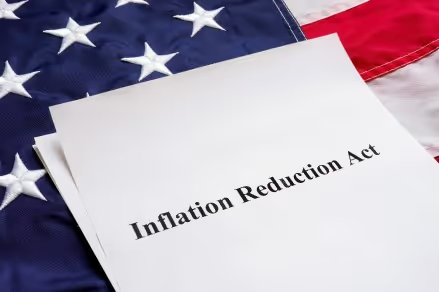
While transition risk and emissions reduction take the focus in the Inflation Reduction Act (2022), physical risk assessment, mitigation, and resiliency are integral to its mission
by Megan Arnold
Competitive & Regulatory Intelligence Manager
Jupiter Intelligence
In his recent op-ed for CNN.com, Dr. Adam Sobel, professor of earth and environmental science at Columbia, author, authority on extreme weather events—and a member of Jupiter’s Board of Advisors—calls the U.S. Congress’ passage of the Inflation Reduction Act (2022) just one step towards addressing the massive challenges that climate change poses to America and the world at large.
The actual impacts of the Act will also be gated at the state level by elected officials and public utilities commissions, some of whom favor preserving a status quo that benefits the fossil fuel industry, as our CEO, Rich Sorkin, recently told The Huffington Post.
Still, Dr. Sobel makes it crystal clear that passage of the $369 billion Act, and its signing into law by President Biden, is a watershed moment. “There has never—never—been climate legislation this substantial passed in the United States,” he writes.
I agree, and while most of the attention around the Act has been focused on emissions reduction, physical climate risk analysis for risk management, resiliency planning, and resilience engineering are key components as well.
It’s critical that, while decreasing emissions, the U.S. must increase climate resiliency for physical infrastructure to prepare for impacts to American homes and livelihoods from climate change-induced extreme weather events. The Act enables us to begin that task by funding physical risk assessment, management, and mitigation initiatives via critical federal agencies such as the:
- National Oceanic and Atmospheric Administration (NOAA)
- Environmental Protection Agency
- Department of Transportation
- Department of Homeland Security
- Council on Environmental Quality
- U.S. Fish and Wildlife Service
The Act stands to support advances in weather forecasting, and more resilient coastlines, infrastructure, and communities. Jupiter already works with multiple federal agencies in climate risk mitigation projects.
As one example, in June, we announced a partnership with NOAA in multiple initiatives designed to help jurisdictions in coastal areas improve their ability to prepare for and withstand the impacts of rising sea levels, and more frequent and intense storms and storm surge, caused by climate change.
While the Act is monumental in itself, it can also be viewed in the context of other recent significant actions taken by U.S. government agencies, such as the SEC’s and the OCC’s call for the assessment, disclosure, and management of the potential impacts of material transition and physical risk on the financial health of banks and publicly traded entities.
Jupiter’s best-in-science, high-to-hyperlocal resolution physical climate risk models and analytics are already assisting public and private sector organizations perform all of these essential tasks. With the state of climate and data science continuing to advance, we expect that physical risk modeling will play a key role supporting the letter and spirit of the Act in the months and years ahead.
As Adam Sobel says, the passage of this legislation is “huge,” it’s “the real thing.” Using tools like Jupiter’s, we can roll up our sleeves and fulfill its mission.
Megan Arnold is the Competitive & Regulatory Intelligence Manager at Jupiter Intelligence.
Jupiter Intelligence is the global leader in climate analytics for resilience and risk management. For further information, please contact us at info@jupiterintel.com.
.webp)
